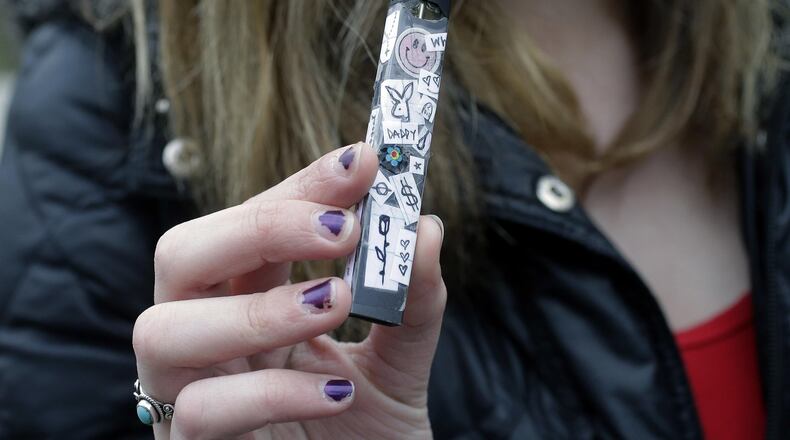Leaders of the health districts have been meeting with Kristina Latta-Landefeld of Envision Partnerships, a local non-profit that works to help people live healthy and drug-free lives, to discuss ways local governments elsewhere in Ohio have enforced similar local laws.
Ohio will not require stores selling tobacco products to obtain any kind of licenses to enforce the state’s new law, because that would require adding more state staff, Latta-Landefeld said. But such licenses could be required locally, said Middletown Health Commissioner Jackie Phillips.
Latta-Landefeld said another technique that could be used to encourage enforcement of the law is public praise of stores that do admirable jobs of preventing underage sales.
One thing they thought made sense, Phillips said, is “if we’re going to have a license, we want to have the same fee on our license, again because we’re county-wide.” Phillips and Butler County Health Commissioner Jenny Bailer decided to take the matter to their health boards to begin discussions.
A change is unlikely before early next year, Phillips said.
The Ohio law requires retailers to post signs that it is illegal to sell tobacco and alternative nicotine products to anyone under 21. Clerks selling such products and owners of the stores can face criminal penalties that increase for multiple violations.
The first offense is a fourth-degree misdemeanor, for which a clerk can face up to 30 days in jail and a fine up to $250, with the store facing a fine of $2,000..
Phillips said people elsewhere have found that “if you license and enforce tobacco retailers, then they will do the right thing, sell to the right people.”
Health experts, including Ohio Department of Health Director Dr. Amy Acton, have praised the law.
“Raising the sales age for tobacco and vaping products from 18 to 21 means that those who can legally obtain these products are less likely to be in the same social networks as high school students,” Acton said.
Sgt. Rich Burkhardt, a spokesman for the Hamilton Police Department, said police “will handle this in the same manner as in the past.”
That past procedure, he said, was, “If they were underage, we would cite them into juvenile court.” Also, “if the person sells to someone under 21, they can be cited for selling to someone under 21.”
Dr. John Morris, co-director of the University of Cincinnati Cancer Institute’s Lung Cancer Program and a UC Health oncologist, also favored the law change.
“Tobacco is a major cause of disease and death in the U.S.,” Morris said. “Not only is it a cause of lung cancer, but also it can cause heart, kidney and other lung diseases as well. It’s unbelievable how many diseases can be attributed to tobacco use.”
Morris and Acton noted studies have found the great majority of people take up smoking in their teens and early 20s.
The new Ohio law “will decrease the possibility that thousands of people will become smokers and will likely positively impact development of these smoking-related diseases, which is wonderful,” Morris said. “Anything that increases the restriction of tobacco sales causes a dramatic drop in smoking rates, so I think we will see less of these diseases in the future, which is a huge benefit for public health as well as the individual.”
The American Lung Association noted that people ages 18 and 19 who smoke often supply younger kids with tobacco products. It also said a 2015 report by the National Academy of Medicine found that if the minimum age were raised to 21 nationwide, that “could prevent 223,000 deaths among people born between 2000 and 2019, including 50,000 fewer dying from lung cancer, the nation’s leading cancer killer.”
“What we will do is much what we do with the alcohol issue, is work with the Ohio Department of Public Safety’s Investigative Unit, and coordinate our efforts with them if there are violations of the law,” said Bob Cornwell, executive director of the Buckeye Sheriffs’ Association.
The Ohio Tobacco Quit Line, 1-800-QUIT-NOW, offers free resources, including quit coaches for quitting tobacco and vaping products.
Meanwhile, the Ohio Department of Mental Health and Addiction Services conducts random-sample checks of tobacco sellers across the state to check for underage sales, said department spokesman Eric Wandersleben.
He added the department also contracts with the Ohio Department of Public Safety to conduct the checks. “If the rate of sales to minors goes above 20 percent, Ohio is out of compliance, which could impact our federal block-grant funding.”
About the Author
